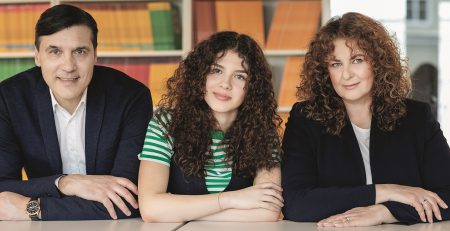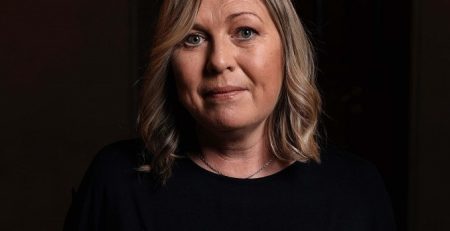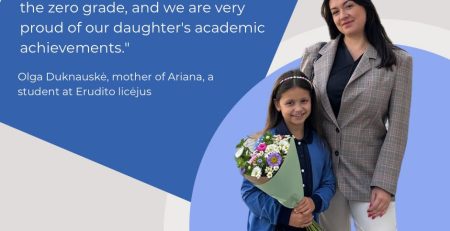After the Intermediate Knowledge Assessments: Why and how the assessment of students’ knowledge needs to be changed
“With the public debate over intermediate assessments in eleventh grade becoming clearer, it has become even more apparent that grading cannot be the main goal of learning. Also – that schools need to find ways to assess students’ abilities and efforts,” says Erudito Licėjus’ founder and director Assoc. Prof. Dr. Nerijus Pačėsa to the portal delfi.lt.
It’s not just academic progress that matters, but also the development of various competencies and critical thinking
“When we talk about a child’s progress, we’re talking about the change in the whole personality, not just academic progress,” emphasizes the head of Erudito Licėjus. “The knowledge acquired develops skills, perspectives, nurtures various competencies. This is where the dilemma arises. We measure academic knowledge according to a ten-point system, and the demonstrated knowledge is translated into grades. But for assessing competencies, no criteria have been essentially devised yet. When everything is measured only by grades, it’s natural that less trust is built. Some important skills remain unnoticed and unassessed. When attention shifts to grades, assessment of academic progress, excessive focus arises, and learning essentially revolves around them.”
According to the school principal, students now mainly focus on the knowledge that will be tested in exams or tests, and on presenting it properly to get a good grade. The current situation with intermediate assessments of eleventh graders clearly shows that we don’t pay much attention to what a person can do with the acquired knowledge. Even the recently retired Minister of Education, Science, and Sport, after reviewing the tasks, found not a single one that required demonstrating critical thinking and application of knowledge. Most often, it’s necessary to repeat memorized formulas and algorithms. This means that in a system oriented towards grades, we pay too little attention to developing critical thinking.
Assessment should create a healthy check-up
According to Assoc. Prof. Dr. N. Pačėsa, in order to reduce the aspect of grading when it becomes very important, knowledge should be assessed frequently and have many assessment objects. “Assessment should create a healthy check-up – to find out how a specific student is doing. When assessment is rare and threshold-based, further paths, choices, opportunities to enter other schools depend on passing or failing. First of all, this creates tremendous stress. In stressful situations, not everyone can demonstrate what they actually know. Secondly, there’s a factor of unpredictability, for example, a student who is very good at studying may make more mistakes due to stress, and vice versa. Frequent assessment, with results consisting of various components, reduces stress, creates a culture of “I studied – I checked.” In this way, the importance of a single grade diminishes because the final result consists of more grades.”
The same can be applied to assessing competencies: “Currently, we are implementing a system that includes the assessment of competencies and various skills. We rely on the same principle – the more tasks involving elements of applied knowledge, and the application is related to the skills that the student needs to demonstrate. If we have more such tasks, assessment is more objective. We must understand that assessment does not necessarily reflect a child’s abilities and knowledge. If there are more assessments, it’s easier for both the child and the parents to understand that it’s a journey of learning. If the assessment is unsatisfactory, one can identify their mistakes and continue learning to correct them. In a system where a standardized test is idolized, waiting for the X day when all students will have to take it, parents’ expectations rise to an inhuman level, as well as the child’s fear. Then the value of the grade becomes very important.”
A grade is not the only criterion
The speaker is convinced: the biggest mistake parents can make is to consider the grade as the only criterion by which they can determine if their child is learning. When too much attention is paid to it, children are under tremendous stress.
“I would advise parents only one thing – to look in the mirror and ask themselves if they, as adults, did everything perfectly in their activities right away. They could also recall when they themselves were studying in school, whether they never received a poor grade? After digesting all this and adding awareness that we live in a different era where the importance of a grade diminishes and the importance of skills grows, they should react accordingly. Sometimes we see the opposite when parents try to solve the difficulties of their school days through their children, for example, trying to ensure that their child learns perfectly and doesn’t make the same mistakes they did. Such an approach causes indescribable harm, which will remain deeply ingrained in the child’s consciousness for a long time,” says Assoc. Prof. Dr. N. Pačėsa, the founder and director of Erudito Licėjus.
This article was published on the delfi.lt portal on April 19, 2024.














